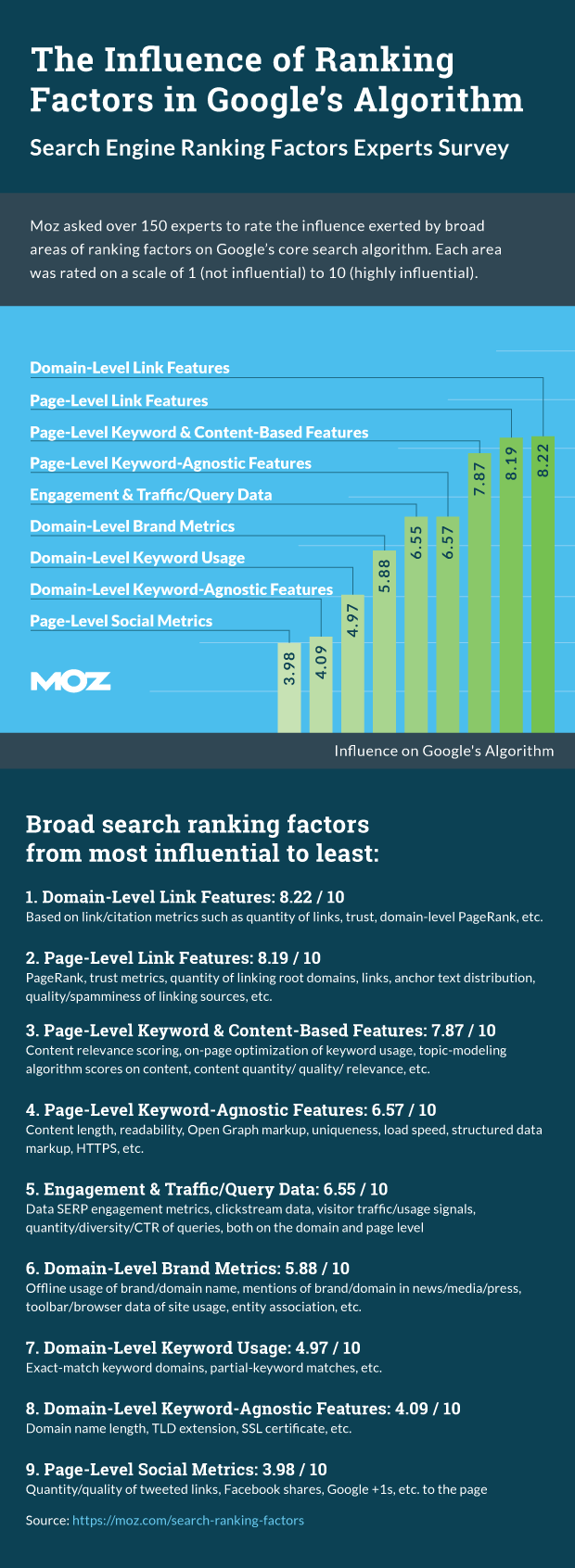Moz’s SEO Pro app is one of our favorite tools for auditing, planning, and reporting on the effectiveness of our search engine marketing strategies. And not only do they offer a fantastic SEO tool, but they give out tons of free insights through their blog, including today’s release of the results of their annual Search Engine Ranking Factors Survey.
Each year Moz gathers responses from some of the world’s leading SEO consultants and specialists on which ranking factors make the greatest (and least) impact on search engine results. They compile and analyze these responses and provide some great insights into what matters when it comes to search engine ranking.
Here’s the infographic of the main results:

There’s a ton of great info in the report but here’s our top three interesting highlights:
1. Some Things Never Change (Like Link-building and Keyword-targeted Content). As you’ll see, domain-level and page-level link features are the top two factors, along with page-level keyword and content-based features. Not really a big surprise. These have been the staples of Google’s ranking algorithms for quite some time and still matter—a lot. So keep building high-quality links back to your website and write interesting that uses the keywords you’re targeting.
2. User Experience Matters…Maybe More Than Ever. One thing that stood out to me was that user engagement/usage scored about a 6.5 as a ranking factor—not at the top of list but certainly not at the bottom either. For a lot of brands, link-building and keyword strategy are something high on the to-do list (and probably something they’re already doing regularly). But I think user experience and engagement should be next on that list. And for many brands, it’s something neglected or assumed. The reality is: It matters, and increasingly so. As Google has refined their search ranking algorithms over the years, every indication is that they are moving ever closer to mimicking what real users want from their searches, which means that user engagement and experience matters more and more. If you can’t keep people on your website and provide an experience they enjoy and want to come back to, Google is going to increasingly count this against you for ranking.
3. Social Metrics Matter…Little. Social metrics and their impact on SEO have been a big conversation for the last couple years, especially with the growth of Facebook, Twitter, and other social networks. But as the two biggies (Facebook and Twitter) decrease in acquiring new users and many younger generations shift to new social platforms (like SnapChat and Instagram), the data is becoming increasingly fractured. (Not to mention the issues Google has in accessing that data on these closed systems.) And let’s not forget how quickly social networks become diluted with spammy link sharing tactics, bots, fake accounts, and all sorts of other dark marketing tactics. I don’t think social (as an SEO metric) is mature enough yet. So if your primary goal for social activity is SEO you might be throwing away some money.
Sidenote: While I think social activity for purely SEO reasons is a poor use of budget, social marketing can have a huge impact on your bottom line for brand awareness & building, customer acquisition, and customer service. When the right content hits the right people on the right network at the right time, great things can happen on social! (But don’t think it’s also giving your SEO some kind of big boost.)
Well, there’s a few insights I hope you find interesting. Definitely check out the whole report—it’s worth some time digging into the details. And if you’re new to SEO, I highly recommend Moz’s Beginner’s Guide to SEO.
I’d love to hear what you think about their report and the current state of SEO. Let me know via a comment or send us an email at [email protected].



